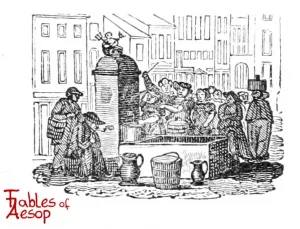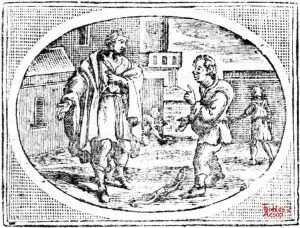Aesop was chided for relaxing and playing with children. His response in today’s language was simple….
Lighten up.

JBR Collection
An Athenian once found Aesop joining merrily in the sports of some children. He ridiculed him for his want of gravity, and Aesop good-temperedly took up a bow, unstrung it, and laid it at his feet. “There, friend,” said he; “that bow, if kept always strained, would lose its spring, and probably snap. Let it go free sometimes, and it will be the fitter for use when it is wanted.”

Samuel Croxall
AN Athenian, one day, found Aesop at play with a company of little boys, at their childish diversions, and began to jeer and laugh at him for it. The old fellow, who was too much a wag himself, to suffer others to ridicule him, took a bow, unstrung, and laid it upon the ground. Then calling the censorious Athenian, Now, philosopher, says he, expound the riddle if you can, and tell us what the unstrained bow implies. The Man, after racking his brains, and scratching his pate about it a considerable time, to no purpose, at last gave it up, and declared he knew not what to make of it. Why, says Aesop, laughing, if you keep a bow always bent it will break presently; but, if you let it go slack, it will be the fitter for use when you want it.
THE APPLICATION
The mind of man is like a bow in this respect; for if it be always kept intent upon business, it will either break, and be good for nothing, or lose that spring and energy which is required in one who would acquit himself with credit. But sports and diversions sooth and slacken it, and keep it in a condition to be exerted to the best advantage upon occasion. It proceeds either from pride, ill-nature, or hypocrisy, when people censure and are offended at the liberties which others use in thus relaxing their minds. Sloth and idleness, by which we neglect the prosecution of our necessary affairs, must be condemned by all means; but those who know how to dispatch the proper business of life well and seasonably enough, need be under no apprehension of being surprised at their diversions, if they have nothing dishonest in them. As these amusements ought to be allowed, because they are proper, so it is no great matter how they are followed; we may, if we like it, as well play with children as men; and rather if we find they can divert us better, which is not very seldom the case; some men and women are useless and untractable in every circumstance of life; and some children so engaging and entertaining, with an agreeable undesigned mixture of innocence and cunning, that the company of the latter is many times the more preferable and diverting.

Thomas Bewick (Aesop at Play)
An Athenian one day found Aesop entertaining himself with a company of little Boys at their childish diversions, and began to jeer and laugh at him for it. Aesop, who was too much a wag himself to suffer others to ridicule him, took a bow unstrung, and laid it upon the ground. Then calling the censorious Athenian, Now philosopher, says he, expound the riddle if you can, and tell us what the unstrained bow implies. The Man, after racking his brains a considerable time to no purpose, at last gave it up, and declared he knew not what to make of it. Why, says Aesop, smiling, if you keep a bow always bent, it will lose its elasticity presently; but if you let it go slack, it will be fitter for use when you want it.
APPLICATION.
The mind of man is not formed for unremitted attention, nor his body for uninterrupted labour; and both are in this respect like a bow. We cannot go through any business requiring intense thought, without unbending the mind, any more than we can perform a long journey without refreshing ourselves by due rest at the several stages of it. Continual labour, as in the case of the bended bow, destroys the elasticity and energy of both body and mind. It is, therefore, absolutely necessary for the studious man to unbend, and the laborious one to take his rest, or both lose their tone and vigour, and become dull and languid. It is to remedy these extremes, that pastimes and diversions ought to be kept up, provided they are innocent. The heart that never tastes of pleasure, shuts up, grows stiff, and is at last incapable of enjoyment.


Aesopus et Arcus
Cum quidam Atticus Aesopum in puerorum turba nucibus ludentem vidisset, restitit et quasi delirum risit. Quod simul sensit Aesopus (senex derisor potius quam deridendus) arcum retensum in media via posuit. “Heus,” inquit, “sapiens! Expedi quid fecerim.” Concurrit populus. Ille diu se torquet, nec quaestionis positae causam intellegit. Novissime succumbit. Tum sophus victor “Cito,” inquit, “arcum rumpes, si semper tensum habueris; at si laxaris, utilis erit cum voles.”
Moral
Sic aliquando lusus animo dari debent, ut ad cogitandum melior tibi redeat.
Perry #505

